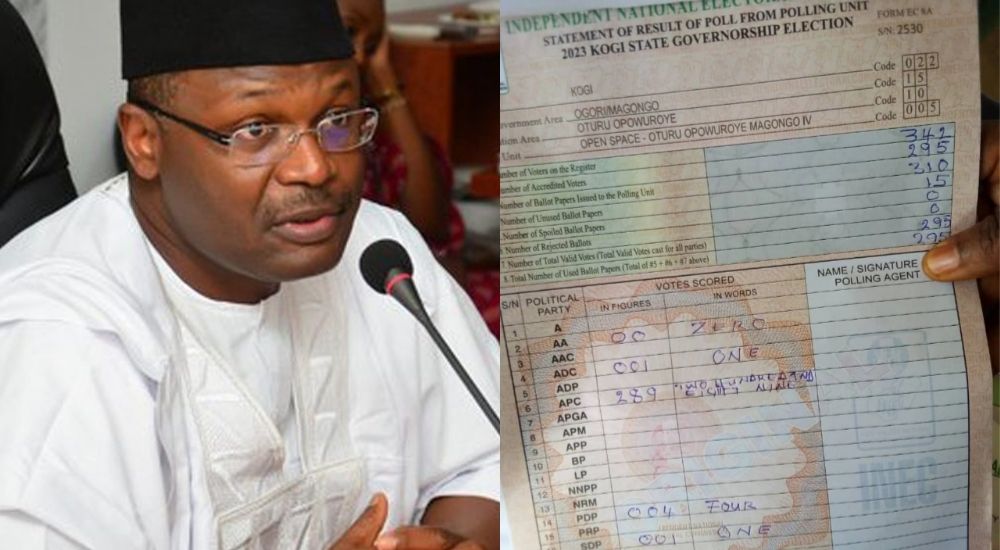Kogi Poll: INEC Explains Why Accreditation Figures Are ‘Changing’ On IReV Portal
The Independent National Electoral Commission (INEC) has refuted reports alleging it is making adjustments to election data on the INEC Result Viewing (IReV) portal following the recently concluded governorship election in Kogi State.
An online news platform had reported that INEC was tampering with the number of accredited voters from the election after alleged inconsistencies were noticed in the figures on the IReV portal, where election results captured with the Bimodal Voter Accreditation System (BVAS) machines are transmitted for public viewing.
Advertisement
However, INEC’s National Commissioner and Chairman of its Information and Voter Education Committee, Mohammed Haruna, dismissed the allegations on Tuesday.
Haruna explained that the BVAS machines used for accrediting voters mostly work offline during elections and therefore the process of transmitting accredited voter data from the machines to INEC’s central server, referred to as synchronization, continues after elections.

“For the avoidance of doubt, the most accurate and up-to-date Voters’ Accreditation Data is available in the Bimodal Voter Accreditation System (BVAS), which is used for the authentication and accreditation of registered voters at various polling units on election day. It automatically retains the accreditation data of all voters,” said the INEC commissioner.
Advertisement
He added, “This exportation of data (from the BVAS) does not happen when the device’s application is inactive or when the internet connectivity is poor. The same experience applies to a situation where more than one BVAS gadget is used at a polling unit with more than 1,250 registered voters. This could be compared to a situation when poor network services delay the delivery of an SMS sent from one individual to another through a mobile phone.
“At the close of poll, Presiding Officers are expected to press the data exportation button on the BVAS to ensure that all the accreditation data are exported to the ABS. This process, referred to as synchronization and which is ongoing, could lead to changes in the accreditation figures as more data flow in to update the existing figures. This is the basis for the caveat provided on the IReV portal, regarding the accreditation figures. The accreditation data cannot be changed on the BVAS after the close of poll.”
INEC had declared Usman Ododo, candidate of the All Progressives Congress (APC), as the winner of the election even though the commission had announced that fresh polls would be conducted on November 18 in 59 polling units in Ogori/Magongo Local Government Area where elections were suspended.

Ododo polled 446,237 votes to beat his closest rival, Muritala Yakubu-Ajaka of the Social Democratic Party (SDP), who scored 259,052 votes.
Advertisement
‘Margin Of Lead Principle’ Applied To Announce Kogi Guber Winner — INEC
The electoral umpire would later announce after declaring a winner that the supplement election earlier scheduled for November 18 would not hold as planned.
According to the commission, it applied the “margin of lead principle” in announcing Ododo as the winner of the governorship poll.
Haliru Sule, INEC’s Head of Voter Education and Publicity in Kogi INEC, disclosed this in Lokoja.
Sule explained that the commission had received complaints during the election, investigated them and announced a re-run in the 59 polling units.
“But when we looked at all that is in contention, we discovered that we have no option than to apply the margin of lead principle.
Advertisement

“The principle says, if the number of PVCs collected in polling units, where election didn’t hold or were cancelled, are not in excess to the difference between the winner and the loser, then the commission can go ahead and make its declaration.
“It’s true we did announce after our findings that there will be a supplementary election in those areas in contention, but after due consideration to the difference, we applied the margin of lead principle.
“It was when we applied the margin of lead principle that we announced the result on Sunday, Nov.12, and declared the winner of the governorship election in Kogi, in the person of Alhaji Usman Ododo of the All Progressives Congress (APC).
“As it is now, there’s not going to be any supplementary or re-run in any polling unit in Kogi.
“By this, the governorship election in Kogi is concluded. What is left is the date for the issuance of a certificate of return to the winner of that election,” he told journalists.



